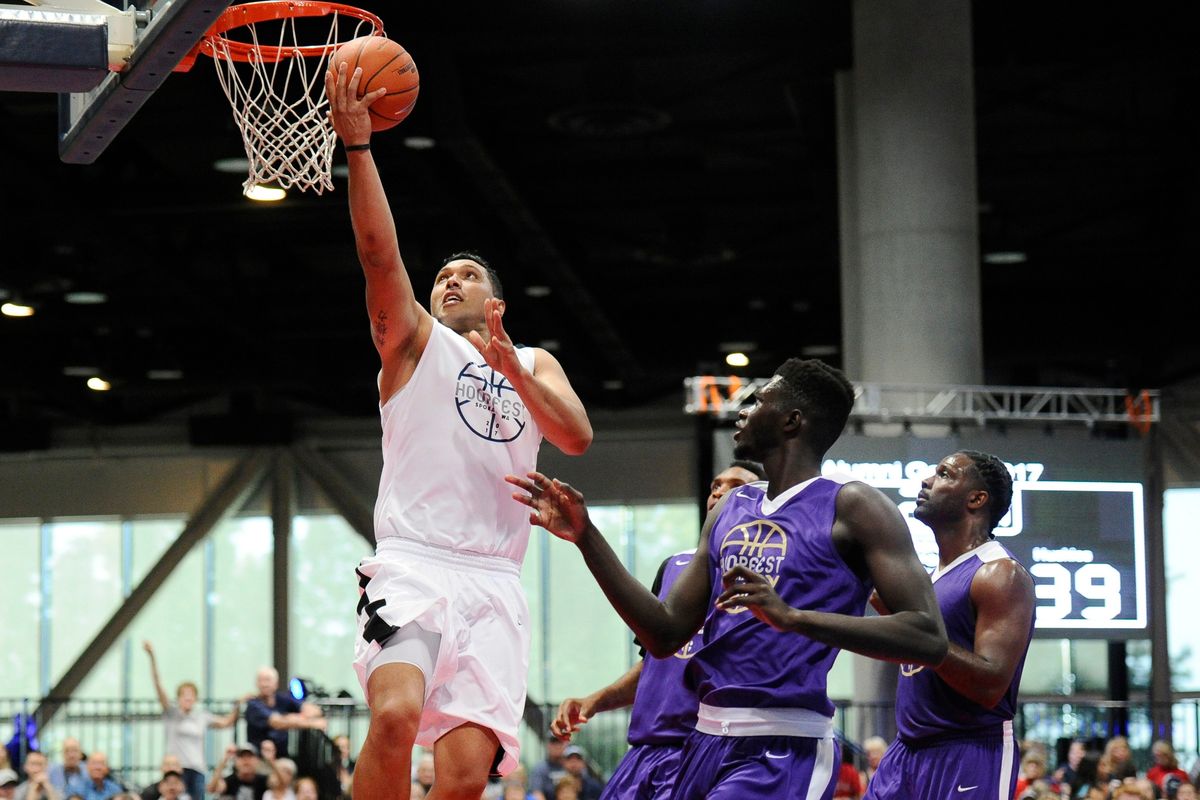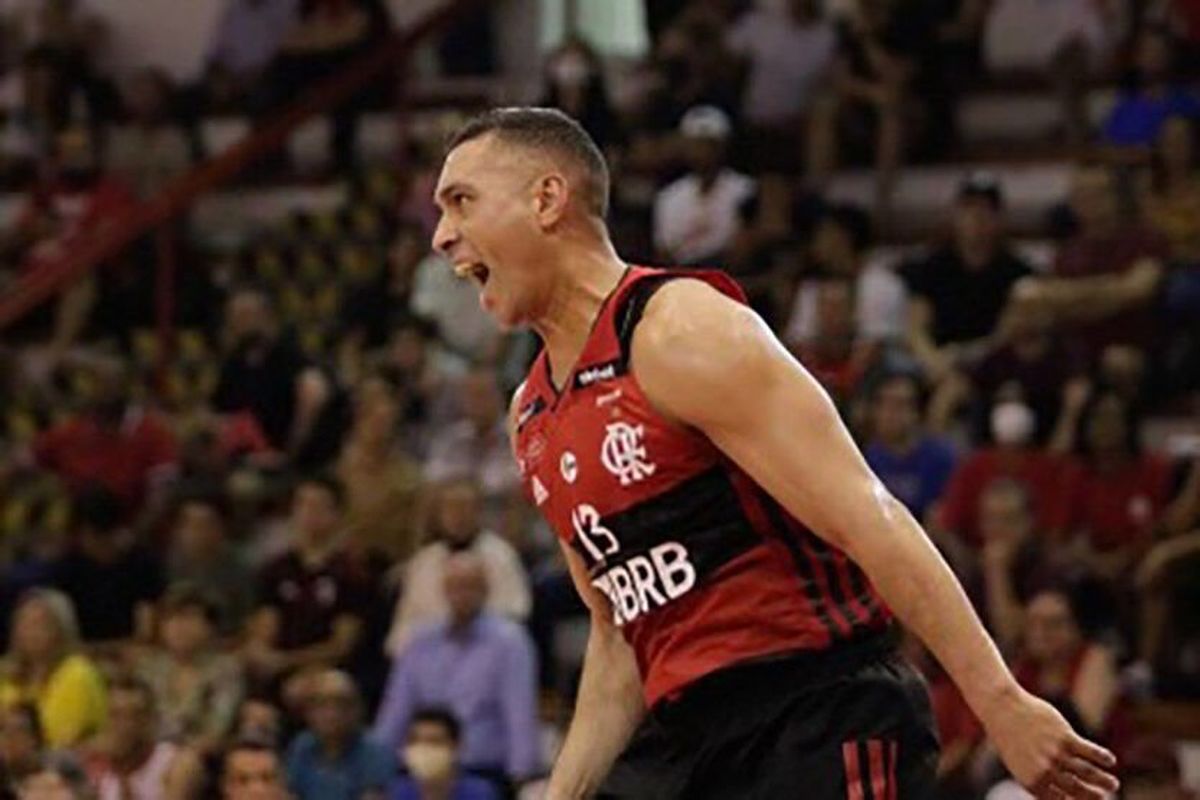Former Gonzaga standout J.P. Batista returns to program as grad assistant
J.P Batista makes a basket for the Gonzaga alumni team versus University of Washington counterparts at the Spokane Convention Center in 2017. (James Snook)
J.P. Batista, in his words, is “trading one dream of mine for another one.”
Batista’s dream of a lengthy playing career, including two standout years at Gonzaga followed by 16 professional seasons, became a reality. He then set his sights on returning to GU and entering the coaching profession. He’ll take his first step in that direction as a graduate assistant for the Zags this season.
Batista has already relocated to Spokane with his wife, Simone, a former Gonzaga women’s basketball player, and two daughters. He was a fan favorite while averaging 16.1 points and 7.9 rebounds in 62 career games during the 2005 and 2006 seasons.
“I’m trying to learn from the best,” the Brazilian native said. “It was a big dream of mine to be able to come back and be part of the Zags again. It’s surreal, being back in town and we’ll see where that leads.
“I actually had offers to continue to play this season, but the opportunity to come back and join the Zags and learn from coach (Mark) Few and (assistants) Brian (Michaelson), Roger (Powell Jr.) and Stephen (Gentry) was an opportunity I couldn’t pass up.
“It was a hard decision (to retire), but I’m trading one dream of mine for another one. I feel at peace with it.”
Batista, 40, adds to the growing population of former Zags’ players residing in Spokane and he joins former teammates Michaelson and Gentry on the staff. Former GU standout guard Gary Bell Jr., who spent two seasons as a grad assistant, is entering his second year as coordinator of basketball administration.
“He’s one of the all-time great Zags on the court and as a human, he’s one of the greatest guys to ever step foot in the program,” Michaelson said. “Obviously with his level of collegiate experience and professionally he played all over Europe and South America, he had a hugely successful career. He’ll bring a lot.
“He played for a lot of coaches in a lot of countries in a lot of different systems. It’s always nice to bring in an outside voice, there’s value with that, and especially when they have the Gonzaga background and know the program. It’ll be nice for us as a staff to throw ideas at him and ask, ‘What did you guys do in these situations?’ because he’s been through it so many times in his career.”
Coaching wasn’t in Batista’s plans during his time as a Zag but entered his mind during the latter stages of his pro career.
“I was extremely fortunate to do what I loved for this long,” Batista said. “It’s very funny because when I was here playing coach Few always said, ‘J.P., don’t ever get into coaching.’ For a long time I never saw myself doing it, but as time went by my time here was such a blessing. It kind of put me into a great career and a very stable career. I see myself trying to do that for other athletes, trying to be a bridge for the next generation and help other kids develop and maybe kids from international backgrounds.”
The 6-foot-9, 269-pound Batista played at Western Nebraska and Barton County (Great Bend, Kansas) community colleges before transferring to Gonzaga. He was a force for the Zags, particularly in the paint while earning the nickname ‘The Brazilian Beast.’ He became one of the program’s most efficient scorers playing alongside Adam Morrison, the nation’s leading scorer in 2006 and currently an analyst on GU radio broadcasts.
Batista averaged 12.4 points and 6.2 rebounds as a part-time starter in 2005. His averages soared to 32.6 minutes, 19.3 points and 9.4 boards as a senior. He made 60% of his career 2-point attempts, 45.5% on 22 3-point attempts and 82.3% at the free-throw line.
“What he did on the court gets severely overlooked because he played with Adam,” Michaelson said, “but you look at his senior year and statistically you can put it up there with any of our guys, Drew (Timme), Domas (Sabonis), Kyle (Wiltjer).”
Batista played the majority of his pro career in France and Brazil after spending his first two seasons in Lithuania. He shot nearly 62% from the field and averaged 7.6 points, 3.4 rebounds and 14.3 minutes per game last season for Flamengo, based in Rio de Janeiro. He posted five consecutive seasons as a double-figures scorer with at least 4.5 boards for Le Mans in France.
And now he transitions from playing professionally to assisting at Gonzaga.
“I took away so many lessons with coach Few and all the staff, Leon (Rice), Tommy (Lloyd), Billy Grier and Jerry Krause,” Batista said. “I learned so many lessons – why not try to do the same.”




